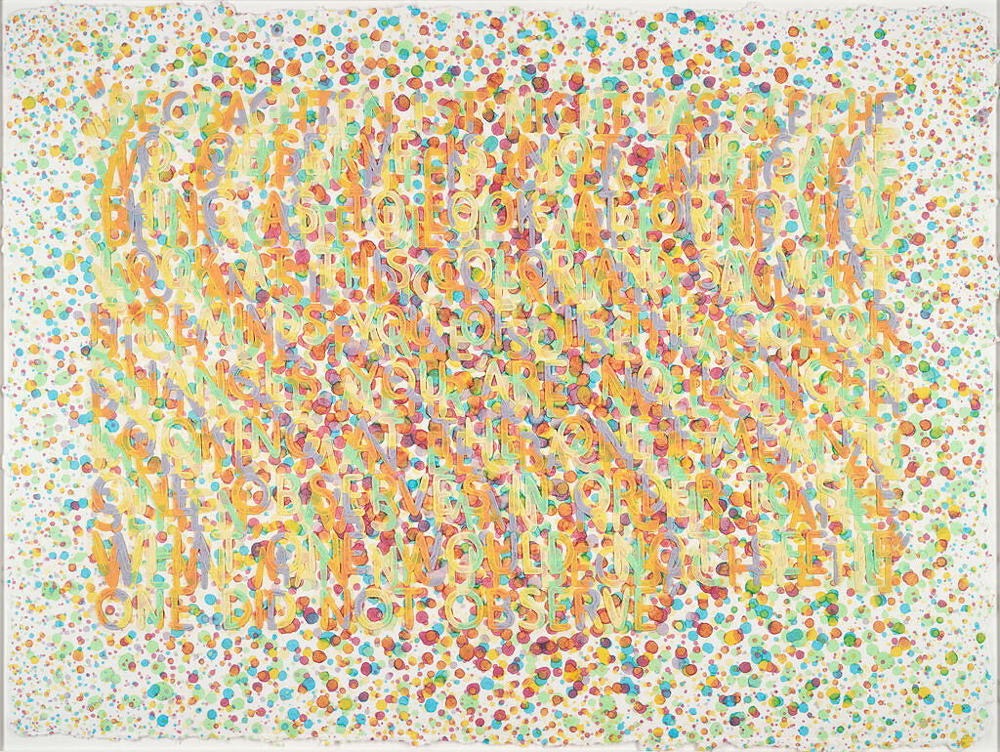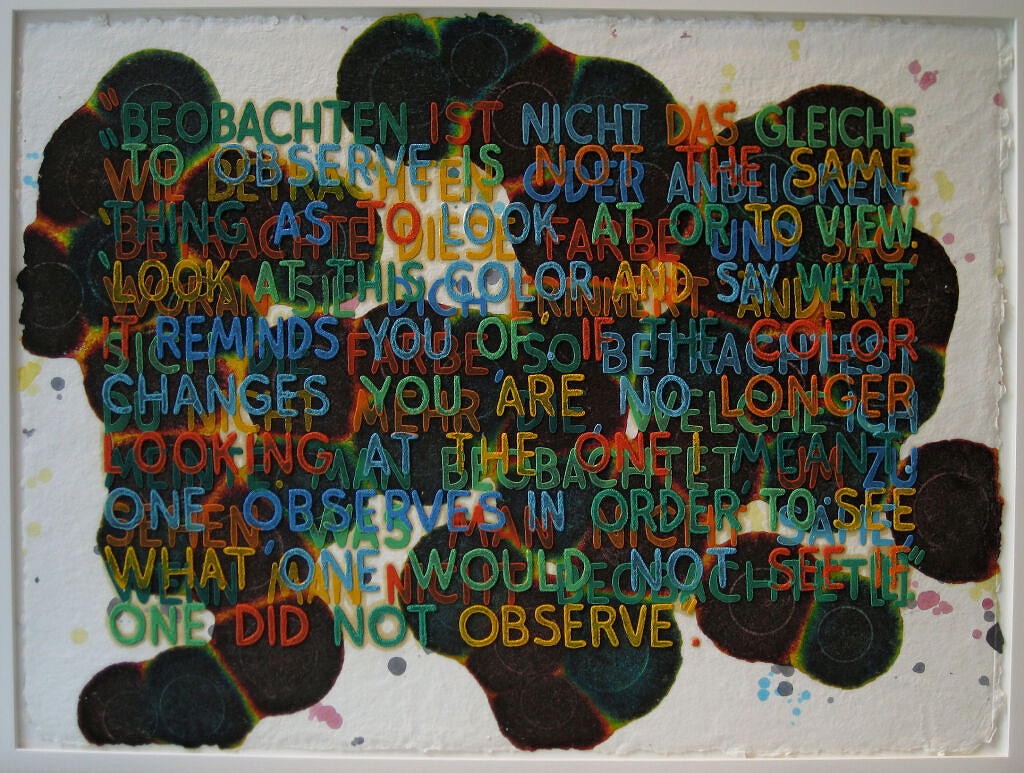ChangingThePast


Mel Bochner: If the Color Changes [MB2042] (2001)
© Mel Bochner
"They toil to expunge themselves. Good riddance!"
Unable to positively change any future, repressive regimes quickly turn their attention to ChangingThePast. This amounts to an impossible objective, though the native impossibility of it won't halt or even meaningfully retard their effort, for outrunning an unsavory past seems imperative if the repressive regime is to gain any respectability. If they can whitewash history, they might stand a chance to reprogram memories. This could result in a sort of forced respectability that repressive regimes always seek. They want to be seen as in favor of mom and apple pie rather than bloody labor strife and Jim Crow Laws. If they are nothing, they are deep-down hypocrites. They desperately want to forget whatever might tarnish their reputation and, their reputation being less than reputable, requires some extraordinary reengineering. They focus on repressing books because they're an easy and reliable target. Not that many of their supporters read all that many books. They've always sown deep suspicions that readers are progressives. They slur other publications and their publishers. Suppose The New York Times publishes a highly-regarded series that turns into a book and a Netflix series tracing the real history of African Americans. In that case, everyone involved gets labeled as "woke." Pure public relations genius soon rebrands "woke" from meaning a form of insightful wisdom to meaning a means for demeaning white people. Wokeness becomes public enemy number one.
Repressive regimes seem uninterested in any distinction between truth and fiction. They favor fiction because it's more difficult to discredit. Facts have the terrible habit of leaving behind an actual record, which might surface to discredit some later assertion, while fiction can stand silent, unable to provide compelling counterarguments. Myths stand tallest along history's horizon. The people, places, and activities that never existed that sound inspiring best serve those aspiring to recreate some past or whitewash some unfortunate action. Brave volunteers battling Northern aggression better serve history's reengineers than stories about poor conscripts' forced campaigns. Repressive regulators seem more repulsive than humble legislators diligently representing honest monopolists. Many of our forebears were absolute scoundrels by any generation's estimation. They were scoundrels even then, even when they were occupied founding our nation. The repressive regimes can't seem to cope with these standard dichotomies. They take umbrage as if personally insulted should someone mention their forebears' indiscretions. Modern history repressors are not precisely exemplars of human propriety. Perhaps that explains their obsession with obscuring underlying history. The fact is that all repressive regimes must be inveterate liars. Otherwise, they could never get elected or hold power while dismantling the government most desired. ChangingThePast just amounts to their overall scheme to shift the context.
Contexts are inherently hostile to any attempt to deliberately shift them. They much prefer to make their changes less intentionally. One might even say that context can only change inadvertently, if only because it's far too subtle and complex for deliberate shifting. One can certainly try, though each attempt inevitably produces something different than intended. There are reasons that con men plan to leave town immediately after performing their cons. They knew from considerable experience that the illusion of having changed some past cannot last very long and that it's much better if one leaves town before the house of cards starts tumbling down. They always tumble.
I finally pulled some family portraits out of clumsy storage this week. They'd hung in the stairway of my birth family's home for as long as I can remember. They'd terrified me from an early age, and their eerie presence has not faded in the intervening years. One of the frames was missing its bubble glass for years. My mom had "mended" the break with Saran Wrap®, rendering my depicted great-grandmother into an even more ghostly presence. I didn't want to recreate the little chamber of horrors I remembered from that stairwell and had been uncertain where to hang those heirlooms. My son was visiting, and he's an experienced curator of images. He has worked in art galleries for ages, so I conscripted him to choose someplace to grace a wall. He chose a perfect spot, and we quickly created a fine little grouping featuring my maternal great-grandfather Nathaniel Parker Wallace, his wife Clara Adeline (Van Schoick) Wallace, and their son, my maternal grandfather, Elza Franklin Wallace. Their presence reminded me that I had not completed researching Clara's family's history, so I set about trying to recreate it.
History's a humbling presence. It can be damnedly tricky to discover and will often, in my experience, reveal something shocking about my existence. My ancestors were also scoundrels. Clara's people had initially come to the New World in 1636 in the form of a twenty-six-year-old laborer working for the Dutch West India Company. He came as a colonizer, with all the brutality that role might imply. He stayed for four years before returning to The Netherlands to marry his sweetheart. Once married, they returned to New Amsterdam to grow vegetables and fight off Indians, raising a clan and setting in motion a westward land migration that would continue for seven generations before Clara's family would finally settle into an Eastern Oregon ranch their inheritors still inhabit. That property was adjacent to water, which my ancestor's donation land claim wasn't. My maternal great-grandfather drove their stock down off their bluff twice daily for water. Clara's family's farm was next to the watering hole. They met, married, and commenced to continue making history my son and his family continue making to this day. I traced Clara's family back to the year 1290, twenty-six generations removed from my grandchildren's.
In that time, every possible combination of human calamity probably occurred. Premature births and deaths, even unmentionable indiscretions. Clara's paternal great-grandfather died of cholera in 1852 while on the Oregon Trail. There was probably almost no end to the trevail just this one thread of family history entailed. I'm not tempted to rewrite that history so that it might cast the most glowingly positive shadows on me. I've grown to revel in actual stories. My self-esteem isn't all that similar to a repressive regime's. Their fragile ego cannot tolerate being seen as human, for their successes, such as they might ever be, insist upon being much more prominent than mere history. They must seem stupendous! If history has taught the more humbled of us anything, it's that actual history is necessarily a humbling thing. It's nothing to revel in. I have royalty in my family history, and I can guarantee anybody that they were each and every one rather rude work, cruel, and eminently unreasonable, capable of worse than I can imagine. And, yeah, they're my kin. I probably carry my share of their most terrible genes. I could have been a conquerer at twenty-six, too, had I really wanted or needed to.
Just so you know, those with adequate time to focus on FixingThePast cannot be focusing on fixing any future worth inhabiting. They play a sleight-of-hand game, hoping to fool enough eyes to blind the people to what they're not doing. While busily whitewashing their prior crimes, they betray our present and attempt to steal our rightful next. My twenty-six generations scream at the prospect of inhabiting anybody's convenient fiction. They didn't commit their sins to forget or misrepresent them. Futures inescapably teeter atop more history than any repressive regime can handle. They toil to expunge themselves. Good riddance!
©2025 by David A. Schmaltz - all rights reserved


